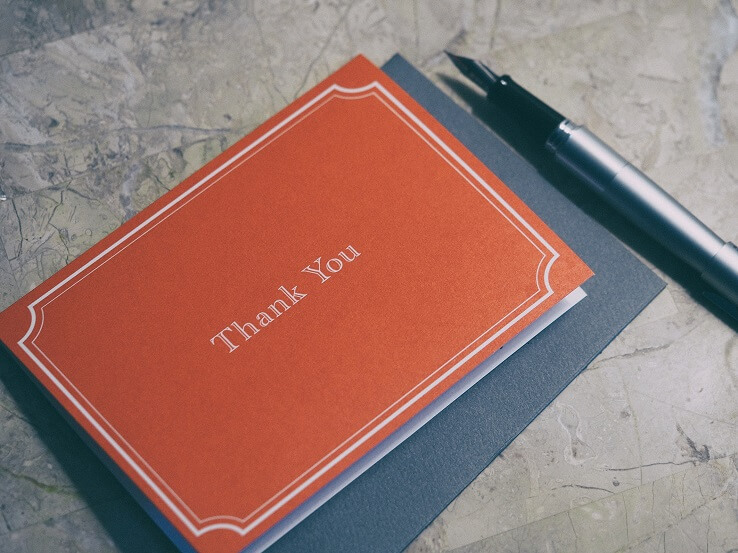Making a positive impression at work doesn’t take a lot. However, doing it right goes a long way. One of the easiest ways to make this impression is by showing appreciation, and the simplest ways to do this is to send a thank you letter to clients for their business after you end your agreement template and get paid for the last invoice template.
Hint: This can be particularly useful to retain clients and create referral opportunities, as it serves as a display of good faith and humanization.
If you’re wondering how to thank a client for their business, look no further.
In this article, we’ll outline the reasons why you should be thanking your freelance clients, along with 4 simple ways to do it with style and professionalism.
The two magic words that build loyalty
Everyone appreciates being thanked for something they’ve gone out of their way to do. Whether it’s something small like running an errand, or more significant like being entrusted with a new role from one of your freelance clients, saying ‘thank-you’ can make the effort seem worthwhile.
This gratitude not only helps the client feel good about what they’ve done, but it shows that as a freelancer or employer, you’re engaged in your work and mindful of those you work with. This helps build loyalty – effortlessly.
On the other hand, forgetting to voice your gratitude can be detrimental to your work position.
Get this:
According to New Voice Media, the #1 reason clients switch services, is because they feel unappreciated.
Understand where your client is coming from, and what it’s like to be them, then follow up with those magic words.
The trick to understanding your clients is knowledge. By doing your research on what clients need and want, you’ll be able to keep them happy and enjoyable to work with.
Sign up for your free trial of Bonsai and gain access to the tools 100,000+ creatives all around the world use to make this magic happen.
Thanking a client for their business: 5 clever ideas
Alright, now we’ve (hopefully) convinced you of the benefits and power of ‘thank-you’, let’s look at different ways you can incorporate it into your working relationships.
Of course, a letter or email are the ultimate go-to methods.
...But for those of you who enjoy getting a bit creative, we have some alternative ideas in store.
Either way, you’ll be showing your client a bit of appreciation easily and effectively.

1. Send a handwritten note
Some may say this method is old fashioned, but we say showing your clients you care with a personalized, handwritten note is classy.
After you send your client a personalized freelance invoice, maybe the biggest invoice yet, due to a newly promoted position consider following up with a thank you note.
The trick here is being focused and specific.
Instead of just saying, “Thanks for your business,” trying personalizing the note – use those writing skills!
Mention why you’re thankful for them specifically, what you’ve gained and how you look forward to more quality experiences together.
You should practice sending thank-you letters regularly. In fact, experts say, due to the incredible power of thank-you notes, they should become as automatic as brushing your teeth.
A thank you letter to clients for their business will help foster a healthy and long-lasting professional relationship.
2. Send a thank-you email
Sure, this ‘thank you for your business email’ may be similar to a handwritten note, however, it’s all about how you write it and when you send it that makes the difference.
The great thing about thank-you emails is that you can send them for any occasion. Typically, they work best for more basic or casual occasions.
So, next time you bill a client, follow up with a thank-you email. This email can be as short or as long as you like, depending on how strongly you feel about the transaction.
Either way, make sure you follow these simple guidelines:
- Use the proper greeting (depending on whether it’s a formal or informal situation).
- Express your thanks and appreciation with details.
- Include how you look forward to business in the future.
- Say thanks again.
- Include an appropriate email sign off.

3. Invite your freelance client to an event
If you’re wondering how to thank a client for their business while adding a bit of flare, you could always try this smooth move.
If your freelance client has gone above and beyond around the end of the year, this is the perfect opportunity to invite him/her to a work-based holiday celebration or end-of-the-year event.
While this definitely depends on the type of working relationship you have with your client, it can also significantly strengthen that relationship.
Use the opportunity to really start off on the right foot by introducing them to a different environment outside of work that’s still professional – but fun.
After the event, you’ll be sure to have solidified and strengthened the relationship – now you can consider sending them a freelance proposal for more work.
4. Send a thoughtful or personalized gift
Let’s be honest.
Everyone loves gifts.
If you want to express your gratitude in a powerful way, find a gift that reaches your freelance client on a personal level, not just professional.
While it’s usually only possible to know the basics about your client, sometimes, that’s all you need.
However, as experts warn, make sure your gifts don’t scream desperate. Or gauche.
What do you know about their background, hobbies or interests? By using these pieces of information to create a personalized gift idea, you’ll be making an incredible impression.
Need some inspiration? Try expanding from these ideas:
- Wine glasses
- Luggage tag
- Briefcase
- Beet mugs
- Notebook
- Coffee mug
These items can be easily personalized through print-on-demand companies, enabling you to create unique designs that match your creative vision for a truly personalized touch. Figuring out how to thank a client for their business in your own way that speaks to the specific client on a personal level will really help you stand out as a freelancer.
Want to know how to stand out even more as a freelancer? Try out Bonsai for free:

5. Make your freelance client laugh
This may seem… funny, but making your client laugh may be the perfect way to casually say thanks.
According to research from London Business School, laughter provides benefits in business as it relieves stress and boredom while boosting wellbeing, creativity, and engagement.
If your client doesn’t have a great sense of humor, you may want to reconsider this approach, however, for those who love a hearty chuckle, this laid back ‘gift’ may be your go-to show of gratitude.
Share a funny cartoon you know your client will find hilarious or create a movie poster on Photoshop that includes your client – it’s up to you, get creative.
If you’re looking for more tools on how to impress your client and organize your freelance career, head on over to Bonsai for inspiration.

Remove “thank-you for your business” from your vocabulary
Alright so now we’ve provided you with some gratitude inspiration, we also come with a warning.
During your thank-you letter to a client for business, whatever you do, don’t JUST say, “thank-you for your business.”
There’s nothing worse – especially if your client has put in some effort.
Thanking your clients, simply for their business seems a bit – cold, which gives off more of a negative message than a positive one.
So, remember: personalized is best as it provides a stronger impact.
Next time you’re setting up an automatic payment for a client, set a reminder for yourself to send along a personalized email as well.
How to thank a client for their business: takeaways
Saying thank-you in an appropriate way, depending on your client relationship, is a powerful way to strengthen your relationship, build brand loyalty and provide an overall sense of goodwill among everyone you work with.
It’s honestly not difficult to do, and once you send your first gift or thank-you letter to clients for their business, you’ll realize just how amazing it feels, as well.
For more tips, tricks, and tools on building brand loyalty and strengthening client relationships, sign up for your free Bonsai trial today.
You won’t regret it.







